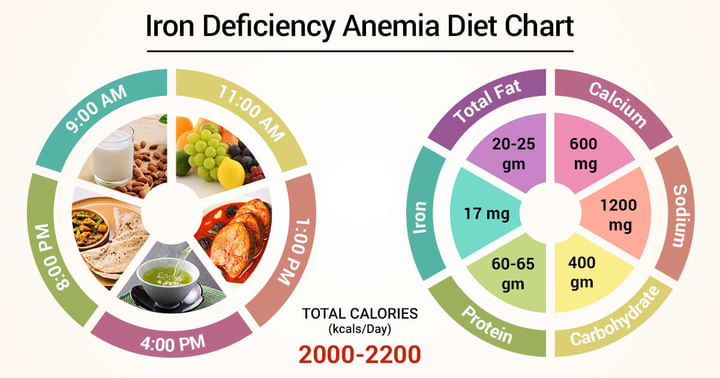Diet Chart For Iron Deficiency Anemia Patients
Last Updated: Aug 20, 2020
About
It is a commonly known fact that anemia is caused by iron deficiency. However, there can be other reasons for the development of anemia. According to World Health Organisation, iron deficiency is the most common nutritional disorder in the world.
Deficiency of iron results in the fewer production of RBCs in the blood which eventually leads to anemia. Oxygen binds itself to hemoglobin in the blood and it is only then that the blood can transport oxygen to the rest of the body. In anemia, blood cannot carry enough oxygen to the cells of the body. Thus, the body feels weak and tired.
The WHO report states that prolonged iron deficiency results in anemia in 30 percent of the world population. The situation is worse in India according to the new Global Nutrition Report 2017. In India, more than half women (51%) of reproductive age have anemia. Women are at a greater risk of anemia due to heavy menstrual bleeding, uterine fibroids, and pregnancy. Iron deficiency occurs when the food one eats does not contain ample amount of iron in it.
The following food items are included in diet meal plan for people suffering from iron deficiency anemia:
- Dark green, leafy vegetables such as broccoli, spinach, fenugreek (methi), amaranth leaves and lettuce have high iron content.
- Dried fruits such as raisins, almond, etc.
- Meat: Red meat, lamb, pork.
- Eggs
- Foods rich in Vitamin C help in absorption of iron such as cauliflower, tomatoes, apple, and oranges.
To recover from anemia quickly, we create a diet plan that includes iron-rich food items. This three-course meal for an anemic person is easy to follow. All food items are listed in this meal plan for iron deficiency anemia problems are easily available in the local market. We also list those food items should be avoided while following this diet meal plan.
Diet Plans for Iron Deficiency Anemia Patients
| Sunday | |
| Breakfast (8:00-8:30AM) | Brown bread (3 slices) + Milk n Banana shake (1 cup) + 4 Almonds + 3 Cashew nuts |
| Mid-Meal (11:00-11:30AM) | 1 Orange + Grapes (1 cup) |
| Lunch (2:00-2:30PM) | Parboiled Rice (1 cup) + Masoor Daal (1/2 cup) + Fried Joseph's coat leaves (1/4th cup) + 1/4th fresh lime + Fish/ Egg/ Veg. Curry (1/2 cup) |
| Evening (4:00-4:30PM) | 1 cup Green tea + Roasted Rice flakes n grated coconut (1/3 cup) |
| Dinner (8:00-8:30PM) | 2-3 Chapati + Veg./ Fish Curry (1/2 cup) + Fried Beetroot (1/3 cup) |
| Monday | |
| Breakfast (8:00-8:30AM) | Egg Poach n Toast (3 slices) + Milk (1 cup) + 4 Almonds + 3 Cashew nuts |
| Mid-Meal (11:00-11:30AM) | 1 Orange + 1 Guava |
| Lunch (2:00-2:30PM) | 2 Chapati + Mixed Daal (1/2 cup) + 1/4th Fresh lime + Potato n Drumstick curry (1/2 cup) + Fried Fish (1pc) |
| Evening (4:00-4:30PM) | 1 cup Green tea + Roasted Rice flakes n grated coconut (1/3 cup) |
| Dinner (8:00-8:30PM) | 2-3 Chapati + Veg./ Fish Curry (1/2 cup) + Fried Beetroot (1/3 cup) |
| Tuesday | |
| Breakfast (8:00-8:30AM) | Vegetable soup (carrot, garlic, spring onions, broccoli, corns) 1 cup + Toast (2 slices) + 4 Almonds + 3 Cashew nuts |
| Mid-Meal (11:00-11:30AM) | 1 Orange + Pomegranate (1/2 cup) |
| Lunch (2:00-2:30PM) | Parboiled Rice (1 cup) + Rajma (1/2 cup) + Fried Joseph's coat leaves (1/4th cup) + 1/4th fresh lime + Fish/ Egg/ Veg. Curry (1/2 cup) |
| Evening (4:00-4:30PM) | 1 cup Green tea + Roasted Rice flakes n grated coconut (1/3 cup) |
| Dinner (8:00-8:30PM) | 2-3 Chapati + Veg./ Fish Curry (1/2 cup) + Fried Beetroot (1/3 cup) |
| Wednesday | |
| Breakfast (8:00-8:30AM) | Spinach Uthappam (2) + Milk (1 cup) + 4 Almonds + 3 Cashew nuts |
| Mid-Meal (11:00-11:30AM) | 1 Orange + Grapes (1 cup) |
| Lunch (2:00-2:30PM) | 2 Chapati + Bengal gram Daal (1/2 cup) + 1/4th Fresh lime + Fried Joseph's coat leaves (1/4th cup) + Paneer/ Soy bean Curry (1/2 cup) |
| Evening (4:00-4:30PM) | 1 cup Green tea + Roasted Rice flakes n grated coconut (1/3 cup) |
| Dinner (8:00-8:30PM) | 2-3 Chapati + Veg./ Fish Curry (1/2 cup) + Fried Beetroot (1/3 cup) |
| Thursday | |
| Breakfast (8:00-8:30AM) | Brown bread (3 slices) + Milk n Banana shake (1 cup) + 4 Almonds + 3 Cashew nuts |
| Mid-Meal (11:00-11:30AM) | 1 Orange + Pomegranate (1/2 cup) |
| Lunch (2:00-2:30PM) | Parboiled Rice (1 cup) + Rajma (1/2 cup) + Fried Joseph's coat leaves (1/4th cup) + 1/4th fresh lime + Fish/ Egg/ Veg. Curry (1/2 cup) |
| Evening (4:00-4:30PM) | 1 cup Green tea + Roasted Rice flakes n grated coconut (1/3 cup) |
| Dinner (8:00-8:30PM) | 2-3 Chapati + Veg./ Fish Curry (1/2 cup) + Fried Beetroot (1/3 cup) |
| Friday | |
| Breakfast (8:00-8:30AM) | Egg Poach n Toast (3 slices) + Milk (1 cup) + 4 Almonds + 3 Cashew nuts |
| Mid-Meal (11:00-11:30AM) | 1 Orange + 1 Guava |
| Lunch (2:00-2:30PM) | 2 Chapati + Mixed Daal (1/2 cup) + 1/4th Fresh lime + Potato n Drumstick curry (1/2 cup) + Fried Fish (1pc) |
| Evening (4:00-4:30PM) | 1 cup Green tea + Roasted Rice flakes n grated coconut (1/3 cup) |
| Dinner (8:00-8:30PM) | 2-3 Chapati + Veg./ Fish Curry (1/2 cup) + Fried Beetroot (1/3 cup) |
| Saturday | |
| Breakfast (8:00-8:30AM) | Spinach Uthappam (2) + Milk (1 cup) + 4 Almonds + 3 Cashew nuts |
| Mid-Meal (11:00-11:30AM) | 1 Orange + Pomegranate (1/2 cup) |
| Lunch (2:00-2:30PM) | Parboiled Rice (1 cup) + Daal (1/2 cup) + Fried Joseph's coat leaves (1/4th cup) + 1/4th fresh lime + Fish/ Egg/ Veg. Curry (1/2 cup) |
| Evening (4:00-4:30PM) | 1 cup Green tea + Roasted Rice flakes n grated coconut (1/3 cup) |
| Dinner (8:00-8:30PM) | 2-3 Chapati + Veg./ Fish Curry (1/2 cup) + Fried Beetroot (1/3 cup) |
Iron Deficiency Anemia Diet Restrictions: Food Items To Limit
If you are suffering from iron deficiency and following this diet plan to recover from the anemia problem, then you can avoid these food items and drinks.
- Red wine. The reservatrol that helps fight heart disease and cancer seems to inhibit iron absorption.
- Coffee. Coffee can also keep you from absorbing iron into your system. Avoid it within an hour either way of an iron supplement or iron rich meal.
- Black and green teas chelate with iron from plant sources, making it indigestible.
- Calcium rich Foods: Calcium interferes with the absorption of iron in the body thereby worsening the condition. Avoid Foods packed with calcium include milk and milk products like cheese, yoghurt, nuts and bananas.
- Gluten-containing foods: Gluten, in some people, damages the intestinal wall preventing absorption of iron and folic acid, both of which are required for the production of red blood cells (RBCs). Gluten is mainly found in pasta, wheat products, barley, rye and oats.
- Phytate-rich foods: Phytates usually bind with the iron present in the digestive tract thereby preventing its absorption. Therefore, people with iron-deficiency anaemia are advised to avoid foods containing phytates or phytic acid like legumes, brown rice, whole-grain wheat and nuts.
- Oxalic acid foods: People with anemia are advised to consume these foods in limited quantities and if possible stay away from them during the course of medication. Foods containing oxalic acid are peanuts, spinach, parsley (ajwain) and chocolates.
Do's And Dont's While Following Diet Plan for Iron Deficiency Anemia
Do's:
- Include more green leafy Vegetables in diet.
- Eat pulses and legumes to increase your iron intake.
- Include all variety fruits and Vegetables.
- Eat lean red meat and liver, which are rich in easily absorbed iron.
- When you consume iron-rich food include a source of Vitamin C. Vitamin C helps with the absorption of iron.
Don'ts:
- Avoid eating dairy products 2 hours before and after you consume iron-rich foods.
- Avoid coffee, tea and colas when trying to boost your iron levels.
Food Items You Can Easily Consume In Iron Deficiency Anemia Problem
To manage iron deficiency and recover quickly from anemia, you can consume these healthy food items:
- Spinach: It is found out that half a cup of boiled spinach contains
- 2 mg of iron and this accounts for about 20 percent of the iron requirement for a woman’s body. So, make sure that you take spinach in your daily diet to increase the blood in your body. Other green leafy vegetables of radish, pumpkin, drumstick can also do the same.
- Red Meat: There is rich iron content in lamb, beef and other red meats. It contains heme-iron which will be easily absorbed by the body. The heart, kidneys, and the liver of the red meats are those parts that contain high quantities of iron.
- Tomatoes: Vitamin C is the main ingredient in tomatoes along with lycopene. The Vitamin C in tomatoes helps in easy absorption of iron. Tomatoes are also rich in beta carotene and Vitamins E and hence help in natural conditioning of the hair and skin.
- Eggs: Eggs are a rich source of proteins and contain a lot of antioxidants that will help in stocking up vitamins in the body when you are suffering from anemia. A large egg is said to contain 1 mg of iron and hence consumption of an egg everyday will help in fighting anemia.
- Soy Beans: Beans are a great source of iron and vitamins. Soybeans are considered to be the beans that contain high iron content. It contains phytic acid that prevents the absorption of iron. Soybean is a low fat and high protein food that fights anemia.
- Apple And Dates: Apple and dates are also known to help in boosting iron levels in the body. Eating an apple a day and about 10 dates daily will help to fight anemia.
- Citrus and vit-c rich foods- Fruits such as lemon, oranges, grape fruits, amla should be consumed as vit-c helps in absorption of non-heame iron (iron from vegetable sources).
References
- Fuerth JH. Iron supplementation of the diet in full-terminfants: A controlled study. The Journal of pediatrics. 1972 Jun 1;80(6):974-9.[Cited 30 June 2019]. Available from:
- Saunders AV, Craig WJ, Baines SK, Posen JS. Iron and vegetarian diets. The Medical Journal of Australia. 2013 Oct 29;199(4):S11-6. [Cited 30 June 2019]. Available from:
- Eat Iron-Rich Foods to Reduce Anemia. Food is Medicine: Anemia 2016 [Internet]. srfmr.org. [Cited 30 June 2019]. Available from:
Table of content
Find Dietitian/Nutritionist near me
Ask a free question
Get FREE multiple opinions from Doctors



